Timeline of European imperialism
This Timeline of European imperialism covers episodes of imperialism by western nations since 1400 but does not take into account imperialism by other nations such as the Inca, the Chinese Empire or Japanese Imperialism, to give only a few of many examples. As such, readers may wish to treat it with some caution if using it as a resource to understand the complete phenomena of imperialism and colonialism.[1]
Pre-1700
- 1402 Castilian invasion of Canary Islands.
- 1420-1425 Portuguese settlement of Madeira.
- 1433-1436 Portuguese settlement of Azores.
- 1445 Portuguese construction of trading post on Arguin island.
- 1450 Portuguese construction of trading post on Goree island.
- 1462 Portuguese settlement of Cape Verde islands.
- 1474 Portuguese settlement of Annobon island.
- 1470's Portuguese settlement of Bioko island.
- 1482 Portuguese construction of Elmina Castle.
- 1493 Portuguese settlement of Sao Tome and Principe.
- 1510 Portuguese conquest of Goa.
- 1511 Portuguese conquest of Malacca City.
- 1517 Portuguese conquest of Colombo.
- 1556 Portuguese colonisation of Timor.
- 1557 Portuguese construction of trading post in Macau.
- 1556-1599 Spanish conquest of Philippines.
- 1598: Dutch established colony on uninhabited island of Mauritius; they abandon it in 1710.[2]
- 1608: Dutch opened their first trading post in India at Golconda.[3]
- 1613: Dutch East India Company expands operations in Java.[4]
- 1613–20: Netherlands becomes England's major rival in trade, fishing, and whaling. The Dutch form alliances with Sweden and the Hanseatic League; England counters with an alliance with Denmark.[5]
- 1623. The Amboyna massacre occurs in Japan with execution of English traders; England closes its commercial base opened in 1613 at Hirado. Trade ends for more than two centuries.
- 1664. French East India Company Chartered for trade in Asia and Africa.[6]
Colonization of North America
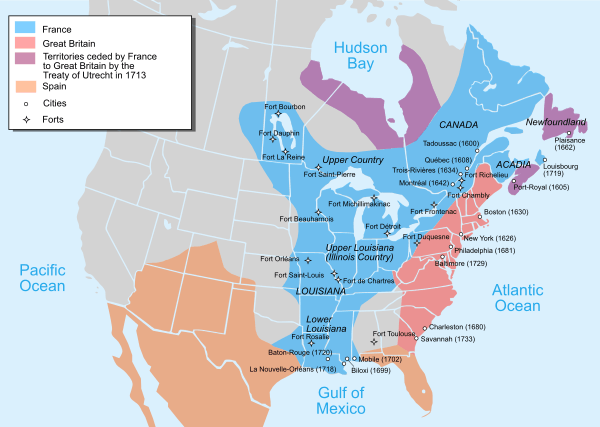
Map of North America (1750) – France (blue), Britain (pink), and Spain (orange)
- 1565 – Saint Augustine, Florida – Spanish[7][8]
- 1604 – Acadia – French[9]
- 1605 – Port Royal – French; in Nova Scotia
- 1607 – Jamestown, Virginia – English; established by Virginia Company
- 1607 – Popham Colony – English; failed effort in Maine
- 1608 – Quebec, Canada – French
- 1610 – Cuper's Cove, First English settlement in Newfoundland; abandoned by 1820
- 1610 – Santa Fe, New Mexico – Spanish[10]
- 1612 – Bermuda – English; established by Virginia Company[11][12]
- 1615 – Fort Nassau – Dutch; became Albany New York
- 1620 – St. John's, Newfoundland – English; capital of Newfoundland
- 1620 – Plymouth Colony, absorbed by Massachusetts Bay– English; small settlement by Pilgrims
- 1621 – Nova Scotia – Scottish
- 1623 – Portsmouth, New Hampshire – English; becomes the Colony of New Hampshire
- 1625 – New Amsterdam – Dutch; becomes New York City
- 1630 – Massachusetts Bay Colony – English; The main Puritan colony.[13]
- 1632 – Williamsburgh – English; becomes the capital of Virginia.[14]
- 1633 – Fort Hoop – Dutch settlement; No part of Hartford Connecticut
- 1633 – Windsor, Connecticut – English
- 1634 – Maryland Colony – English
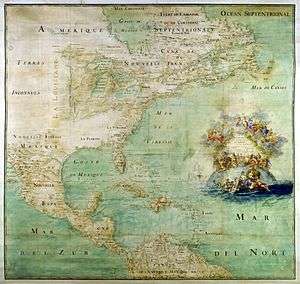
Map of the northern part and parts of the southern parts of the America, from the mouth of the Saint Laurent River to the Island of Cayenne, with the new discoveries of the Mississippi (or Colbert) River. This map shows the results of the expeditions of Father Marquette and L. Jolliet (1673) and the Cavelier de la Salle expedition in the Mississippi valley. The map shows three forts built between 1679 and 1680: Conty fort (near Niagara Falls), Miamis Fort (south of Michigan lake), and Crèvecœur fort (Left bank of the Illinois River). Mississippi river course is only shown downstream of Ohio confluence.
- 1634 – Wethersfield, Connecticut – First English settlement in Connecticut, comprising migrants from Massachusetts Bay.[15]
- 1635 – Territory of Sagadahock – English
- 1636 – Providence Plantations – English; became Rhode Island* [16]
- 1636 – Connecticut Colony – English
- 1638 – New Haven Colony – English; later merged into Connecticut colony
- 1638 – Fort Christina – Swedish; now part of Wilmington Delaware
- 1638 – Hampton, New Hampshire – English[17]
- 1639 – San Marcos – Spanish
- 1640? – Swedesboro- Swedish
- 1651 – Fort Casimir – Dutch
- 1660 – Bergen – Dutch
- 1670 – Charleston, South Carolina – English[18]
- 1682 – Pennsylvania – English Quakers;[19]
- 1683? – Fort Saint Louis (Illinois)- French;[20]
- 1683 – East New Jersey – Scottish
- 1684 – Stuarts Town, Carolina – Scottish
- 1685 – Fort Saint Louis (Texas)- French
- 1698 – Pensacola, Florida – Spanish
- 1699 – Louisiana (New France) – French;[21]
1700 to 1799
- 1704: Gibraltar captured by British on 4 August; becomes British naval bastion into the 21st century[22]
- 1713: Treaty of Utrecht, ends War of the Spanish Succession and gives Britain territorial gains, especially Gibraltar, Acadia. Newfoundland, and the land surrounding Hudson Bay. The lower Great Lakes-Ohio area became a free trade zone.[23]
- 1756–63 Seven Years' War, Britain, Prussia, and Hanover against France, Austria, the Russian Empire, Sweden, and Saxony. Major battles in Europe and North America; the East India Company also in involved in the Third Carnatic War (1756–1763) in India. Britain victorious and takes control of all of Canada; France seeks revenge.[24][25]
- 1775–83: American Revolutionary War as 13 Colonies revolt; Britain has no major allies. It is the first successful colonial revolt in European history.[26]
- 1783: Treaty of Paris ends Revolutionary War; British give generous terms to US with boundaries as British North America on north, Mississippi River on west, Florida on south. Britain gives East and West Florida to Spain[27]
- 1784: Britain allows trade with America but forbid some American food exports to West Indies; British exports to America reach £3.7 million, imports only £750,000
- 1784: Pitt's India Act re-organised the British East India Company to minimise corruption; it centralised British rule by increasing the power of the Governor-General
1793 to 1870
- 1792: In India, British victory over Tipu Sultan in Third Anglo-Mysore War; cession of one half of Mysore to the British and their allies.[28]
- 1793–1815: Wars of the French Revolution, and Napoleonic wars; French conquests spread Ideas of the French Revolution, including abolition of serfdom, modern legal systems, and of Holy Roman Empire; stimulate rise of nationalism
- 1804–1865: Russia expand across Siberia to Pacific.[29]
- 1804–1813: Uprising in Serbia against the ruling Ottoman Empire
- 1807: Britain makes the international slave trade criminal; Slave Trade Act 1807; United States criminalizes the international slave trade at the same time.
- 1810–1820s: Spanish American wars of independence[30]
- 1810–1821: Mexican War of Independence[31]
- 1814–15: Congress of Vienna; Reverses French conquests; restores reactionaries to power. However, many liberal reforms persist; Russia emerges as a powerful factor in European affairs.[32]
- 1815–1817: Serbian uprising leading to Serbian autonomy
- 1819: Stamford Raffles founds Singapore as outpost of British Empire.[33]
- 1821–1823: Greek War of Independence
- 1822: Independence of Brazil proclaimed by Dom Pedro I[34]
- 1822–27: George Canning in charge of British foreign policy, avoids co-operation with European powers.[35]
- 1823: United States issues Monroe Doctrine to preserve newly independent Latin American states; issued in cooperation with Britain, whose goal is to prevent French & Spanish influence and allow British merchants access to the opening markets. American goal is to prevent the New World becoming a battlefield among European powers.[36]
- 1821–32: Greece wins Greek War of Independence against the Ottoman Empire; the 1832 Treaty of Constantinople is ratified at the London Conference of 1832.
- 1830: Start of the French conquest of Algeria[37]
- 1833: Slavery Abolition Act 1833 frees slaves in British Empire; the owners (who mostly reside in Britain) are paid £20 million.
- 1839–42: Britain wages First Opium War against China
- 1842: Britain forces China to sign the Treaty of Nanking. It opens trade, cedes territory (especially Hong Kong), fixes Chinese tariffs at a low rate, grants extraterritorial rights to foreigners, and provides both a most favoured nation clause, as well as diplomatic representation.[38]
- 1845: Oregon boundary dispute threatens war between Great Britain and the United States.[39]
- 1846: Oregon Treaty ends dispute with the United States. Border settled on the 49th parallel. The British territory becomes British Columbia and later joins Canada. The American territory becomes the states of Washington and Oregon.[40][41]
- 1846: The Corn Laws are repealed; free trade in grain strengthens the British economy By increasing trade with exporting nations.[42]
- 1845: Republic of Texas voluntarily joins the United States. Annexation causes the Mexican–American War, 1846–48.
- 1848: United States victorious in Mexican–American War; annexes area from New Mexico to California
- 1848–49: Second Sikh war; the British East India Company subjugates the Sikh Empire, and annexes Punjab
- 1857: Indian Mutiny suppressed. It has major long-term impact on reluctance to grant independence to Indians.[43]
- 1858: The government of India transferred from East India Company to the crown; the government appoints a viceroy. He rules portions of India directly, and dominates local princes in the other portions. British rule guarantees that local wars will not happen inside India.[44][45]
- 1861–1867: French intervention in Mexico; United States demands French withdrawal after 1865; France removes its army, and its puppet Emperor is executed.
- 1862: Treaty of Saigon; France occupies three provinces in southern Vietnam.[46]
- 1863: France establishes a protectorate over Cambodia.
- 1867: British North America Act, 1867 creates the Dominion of Canada, a federation with internal self-government; foreign and defence matters are still handled by London.[47]
1870–1914
- 1874: Second Treaty of Saigon, France controls all of South Vietnam
- 1875–1900: Britain, France, Germany, Portugal and Italy join in the Scramble for Africa[48]
- 1876: Korea signs unequal treaty with Japan
- 1878: Austria occupies Bosnia-Herzegovina while Ottoman Empire is at war with Russia
- 1878: Ottoman Empire loses main possessions in Europe; Treaty of Berlin recognising the independence of Romania, Serbia and Montenegro and the autonomy of Bulgaria
- 1882: Korea signs unequal treaties with the United States and others
- 1884: France makes Vietnam a colony.
- 1885: King Leopold of Belgium establishes the Congo Free State, under his personal control. There is no role for the government of Belgium until the King's financial difficulties lead to a series of loans; it takes over in 1908.[49]
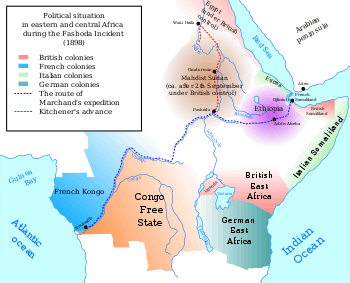
Central and east Africa, 1898, during the Fashoda Incident.
- 1893: France makes Laos a protectorate.[50]
- 1893: Overthrow of the Kingdom of Hawaii
- 1895: Creation of French West Africa (AOF)
- 1895–1910: Japan takes full control of Korea.[51]
- 1898: Fashoda Incident in Africa threatens war between France and Britain; Settled peacefully
- 1898: United States demands that Spain immediately reform its rule in Cuba; Spain procrastinates; US wins short Spanish–American War
- 1898: Annexation of the Republic of Hawaii as a United States territory via the Newlands Resolution[52]
- 1898: In Treaty of Paris, US obtains the Philippines, Guam, Puerto Rico, and makes Cuba a protectorate. For the first time US has an overseas empire.[53]
- 1899–1900: Anti-imperialist sentiment in the United States mobilizes but fails to stop the expansion.[54]
- 1900-08: King Leopold is denounced worldwide for his maltreatment of rubber workers in Congo. The campaign is led by journalist E.D. Morel.[55]
- 1908: Austria annexes Bosnia and Herzegovina; pays compensation for it; Serbia is outraged
- 1914: Most Frenchmen ignored foreign affairs and colonial issues. The chief pressure group was the Parti colonial, a coalition of 50 organizations with a combined total of 5,000 members.[56]
1914–1939
- 1917: Jones Act gives full American citizenship to Puerto Ricans.[57]
- 1918: Austrian Empire ends, Austria becomes a republic, Hungary becomes a kingdom, Czechoslovakia, Poland, and Yugoslavia become independent
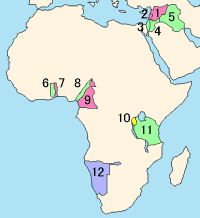
League of Nations mandates in the Middle East and Africa: #1–5 ex–Ottoman Empire; #6–12 ex–German Empire.
1. Syria, 2. Lebanon, 3. Palestine, 4. Transjordan, 5. Mesopotamia, 6. British Togoland, 7. French Togoland, 8. British Cameroons, 9. French Cameroun, 10. Ruanda-Urundi, 11. Tanganyika and 12. South West Africa
1. Syria, 2. Lebanon, 3. Palestine, 4. Transjordan, 5. Mesopotamia, 6. British Togoland, 7. French Togoland, 8. British Cameroons, 9. French Cameroun, 10. Ruanda-Urundi, 11. Tanganyika and 12. South West Africa
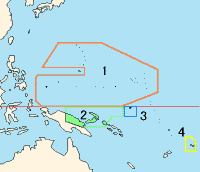
League Mandates in the Pacific, All from the German Empire: 1. South Pacific Mandate, 2. Territory of New Guinea, 3. Nauru and 4. Western Samoa
- 1919: German and Ottoman colonies came under the control of the League of Nations, which distributed them as "mandates" to Great Britain, France, Japan, Belgium, South Africa, Australia and New Zealand.[58]
Maps
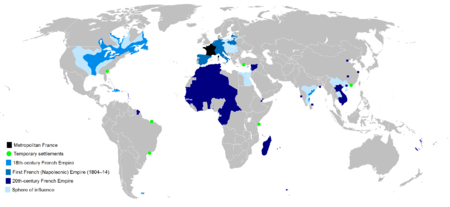
French conquests and territories
gollark: Nope. UEFI.
gollark: Horse = bee neuron data (78EB)
gollark: This is very unfortunate, Horse.
gollark: It has done, yes.
gollark: Only ARM.
See also
Notes
- Melvin E. Page, ed. Colonialism: An International Social, Cultural, and Political Encyclopedia (3 vol. 2003); vol. 2 pages 647-831 has a detailed chronology
- Perry J. Moree, A Concise History of Dutch Mauritius, 1598-1710: A Fruitful and Healthy Land (Routledge, 1998).
- Om Prakash, The Dutch East India Company and the Economy of Bengal, 1630-1720 (2014)
- Leonard Blusse, An Insane Administration and Insanitary Town: The Dutch East India Company and Batavia (1619–1799) (Springer Netherlands, 1985).
- Jack S. Levy and Salvatore Ali. "From commercial competition to strategic rivalry to war: The evolution of the Anglo-Dutch rivalry, 1609-52." in Paul Diehl, ed. The dynamics of enduring rivalries (1998) pp29-63.
- Donald C. Wellington, French East India companies: A historical account and record of trade (Hamilton Books, 2006)
- Theodore G. Corbett, "Migration to a Spanish imperial frontier in the seventeenth and eighteenth centuries: St. Augustine." Hispanic American Historical Review (1974): 414–430 in JSTOR
- Charles W. Arnade, "Cattle Raising in Spanish Florida, 1513–1763." Agricultural History (1961): 116–124. in JSTOR
- Griffiths, N.E.S. (2005). From Migrant to Acadian: A North American Border People, 1604-1755. McGill-Queen's University Press. ISBN 978-0-7735-2699-0.
- Horgan, Paul (1994). The Centuries of Santa Fe. University of New Mexico Press. ISBN 9780826314918.
- Addison Emery Verrill, The Bermuda Islands: Their Scenery, Climate, Productions, Physiography, Natural History and Geology: With Sketches of Their Early History and the Changes Due to Man (1902) online
- Wesley Frank Craven, "An introduction to the history of Bermuda." William and Mary College Quarterly (1937): 318–362. in JSTOR
- George F. Dow, Every Day Life in the Massachusetts Bay Colony (1935).
- Olmert, Michael (2007). Official Guide to Colonial Williamsburg. Colonial Williamsburg Foundation. ISBN 9780879352349.
- Liam Connell, "‘A Great or Notorious Liar’: Katherine Harrison and her Neighbours, Wethersfield, Connecticut, 1668–1670." Eras 12.2 (2011); Story of an accused witch put on trial but survived. online
- Arnold, Samuel Greene (1859). History of the State of Rhode Island and Providence Plantations vol 1 1636–1700. Applewood Books.
- Joseph Dow (1894). History of the Town of Hampton, New Hampshire: From Its Settlement in 1638, to the Autumn of 1892.
- Fraser, Walter J. (1990). Charleston! Charleston!: The History of a Southern City. University of South Carolina Press. ISBN 9780872497979.
- Illick, Joseph E. (1976). Colonial Pennsylvania: A History. Scribner. ISBN 9780684145655.
- John Francis McDermott, The French in the Mississippi Valley (1965)
- Carl A. Brasseaux, "The Moral Climate of French Colonial Louisiana, 1699–1763." Louisiana History (1986): 27-41. in JSTOR
- Stetson Conn, Gibraltar in British diplomacy in the eighteenth century (1942).
- R. Cole Harris; Geoffrey J. Matthews (1987). Historical Atlas of Canada: From the beginning to 1800. U. of Toronto Press. p. 102.
- Fred Anderson, Crucible of War: The Seven Years' War and the Fate of Empire in British North America, 1754–1766 (2001)
- Julia Osman, online essay
- Edward Gray and Jane Kamensky, eds/ The Oxford Handbook of the American Revolution (2013) Wide-ranging overview by scholars.
- Andrew Stockley, Britain and France at the Birth of America: The European Powers and the Peace Negotiations of 1782-1783 (U. of Exeter Press, 2001)
- Denys Mostyn Forrest, Tiger of Mysore: The life and death of Tipu Sultan (1970)
- Mark Bassin, "Inventing Siberia: visions of the Russian East in the early nineteenth century." American Historical Review 96.3 (1991): 763-794. online
- Rory Miller, Britain and Latin America in the nineteenth and twentieth centuries (1993).
- Barbara A. Tenenbaum, "Merchants, Money, and Mischief the British in Mexico, 1821–1862." The Americas 35.03 (1979): 317-339.
- Brian E. Vick, The Congress of Vienna: power and politics after Napoleon (Harvard UP, 2014).
- Victoria Glendinning, Raffles and the Golden Opportunity (2012).
- Alan K. Manchester, "The recognition of Brazilian independence." Hispanic American Historical Review 31.1 (1951): 80-96 in JSTOR.
- H.W.V. Temperley, The Foreign Policy of Canning, 1822-1827: England, the Neo-Holy Alliance, and the New World (1925) online
- Dexter Perkins, "Europe, Spanish America, and the Monroe Doctrine." American Historical Review (1922) 27#2 pp: 207–218. in JSTOR
- Jennifer E. Sessions (2015). By Sword and Plow: France and the Conquest of Algeria. Cornell University Press.
- James S. Olson and Robert Shadle, eds. Historical dictionary of the British empire (1996) vol 1 p 47
- Joseph Schafer, "The British Attitude toward the Oregon Question, 1815–1846." American Historical Review (1911) 16#2 pp: 273–299. in JSTOR
- Richard W. Van Alstyne, "International Rivalries in Pacific Northwest." Oregon Historical Quarterly (1945): 185–218. in JSTOR
- David M. Pletcher, The Diplomacy of Annexation: Texas, Oregon, and the Mexican War (1973).
- Bernard Semmel, The Rise of Free Trade Imperialism: Classical Political Economy the Empire of Free Trade and Imperialism, 1750–1850 (2004)
- Michael Adas, "Twentieth Century Approaches to the Indian Mutiny of 1857–58", Journal of Asian History (1971) 5#1 pp 1–19
- Bhupen Qanungo, "A study of British relations with the native states of India, 1858–62." Journal of Asian Studies (1967) 26#2 pp: 251–265.
- Donovan Williams, "The Council of India and the Relationship between the Home and Supreme Governments, 1858–1870." English Historical Review (1966): 56–73 in JSTOR.
- Oscar Chapuis, The Last Emperors of Vietnam: From Tu Duc to Bao Dai (Greenwood, 2000). online
- Donald Creighton, The Road to Confederation: The Emergence of Canada, 1863–1867 (1965).
- Thomas Pakenham, Scramble for Africa: The White Man's Conques bum hole t of the Dark Continent from 1876–1912 (1991)
- Adam Hochschild, King Leopold's Ghost (1998)
- Martin Stuart-Fox, "The French in Laos, 1887–1945." Modern Asian Studies (1995) 29#1 pp: 111–139.
- Peter Duus, The Abacus and the Sword: The Japanese Penetration of Korea, 1895–1910 (1995)
- Thomas J. Osborne, "The Main Reason for Hawaiian Annexation in July, 1898," Oregon Historical Quarterly (1970) 71#2 pp. 161–178 in JSTOR
- Fabian Hilfrich, Debating American Exceptionalism: Empire and Democracy in the Wake of the Spanish–American War (Palgrave Macmillan, 2012)
- Christopher Lasch, "The Anti-Imperialists, the Philippines, and the Inequality of Man." Journal of Southern History (1958): 319–331. in JSTOR
- Matthew G. Stanard, Selling the Congo: A History of European Pro-Empire Propaganda and the Making of Belgian Imperialism (U of Nebraska Press, 2012).
- Anthony Adamthwaite, Grandeur And Misery: France's Bid for Power in Europe, 1914–1940 (1995) p 6
- Willie Santana, "Incorporating the Lonely Star: How Puerto Rico Became Incorporated and Earned a Place in the Sisterhood of States." Tennessee Journal of Law and Policy 9 (2013) pp: 433+ online.
- Nele Matz, "Civilization and the Mandate System under the League of Nations as Origin of Trusteeship." Max Planck Yearbook of United Nations Law (2005) 9#1 pp: 47–95. online
Further reading
Surveys
- Albrecht-Carrié, René. A Diplomatic History of Europe Since the Congress of Vienna (1958), 736pp; a basic introduction, 1815–1955 online free to borrow
- Baumgart, Winfried. Imperialism: The Idea and Reality of British and French Colonial Expansion, 1880–1914 (1982)
- Betts, Raymond F. The False Dawn: European Imperialism in the Nineteenth Century (1975)
- Betts, Raymond F. Uncertain Dimensions: Western Overseas Empires in the Twentieth Century (1985)
- Black, Jeremy. European International Relations, 1648–1815 (2002) excerpt and text search
- Burbank, Jane, and Frederick Cooper. Empires in World History: Power and the Politics of Difference (2011), Very wide-ranging coverage from Rome to the 1980s; 511pp
- Dodge, Ernest S. Islands and Empires: Western Impact on the Pacific and East Asia (1976)
- Furber, Holden. Rival Empires of Trade in the Orient, 1600-1800 (1976)
- Furber, Holden, and Boyd C Shafer. Rival Empires of Trade in the Orient, 1600-1800 (1976)
- Hodge, Carl Cavanagh, ed. Encyclopedia of the Age of Imperialism, 1800-1914 (2 vol. 2007), Focus on European leaders
- Kennedy, Paul. The Rise and Fall of the Great Powers: Economic Change and Military Conflict from 1500 to 2000 (1989) excerpt and text search; very wide-ranging, with much on economic power
- Langer, William. An Encyclopedia of World History (5th ed. 1973), very detailed outline; 6th edition ed. by Peter Stearns (2001) has more detail on Third World
- McAlister, Lyle N. Spain and Portugal in the New World, 1492-1700 (1984)
- Mowat, R. B. A History of European Diplomacy 1815–1914 (1922), basic introduction
- Page, Melvin E. ed. Colonialism: An International Social, Cultural, and Political Encyclopedia (3 vol. 2003); vol. 3 consists of primary documents; vol. 2 pages 647-831 has a detailed chronology
- Porter, Andrew. European Imperialism, 1860-1914 (1996), Brief survey focuses on historiography
- Savelle, Max. Empires to Nations: Expansion in America, 1713-1824 (1975)
- Smith, Tony. The Pattern of Imperialism: The United States, Great Britain and the Late-Industrializing World Since 1815 (1981)
- Taylor, A.J.P. The Struggle for Mastery in Europe: 1848–1918 (1954) excerpt and text search; advanced analysis Of diplomacy
- Wilson, Henry. The Imperial Experience in Sub-Saharan Africa since 1870 (1977)
Africa
- Pakenham, Thomas (1991). The Scramble for Africa, 1876–1912. New York: Random House. ISBN 0-394-51576-5..
- Wesseling, H.L. and Arnold J. Pomerans. Divide and rule: The partition of Africa, 1880–1914 (Praeger, 1996.) online
Asia
- Cady, John Frank. The roots of French imperialism in Eastern Asia (1967).
- Darby, Phillip. Three Faces of Imperialism: British and American Approaches to Asia and Africa, 1870-1970 (1987)
- Davis, Clarence B. "Financing Imperialism: British and American Bankers as Vectors of Imperial Expansion in China, 1908–1920." Business History Review 56.02 (1982): 236-264.
- Harris, Paul W. "Cultural imperialism and American protestant missionaries: collaboration and dependency in mid-nineteenth-century China." Pacific Historical Review (1991): 309-338. in JSTOR
- Kazemzadeh, Firuz. Russia and Britain in Persia, 1864-1914: A Study in Imperialism (1968)
- Lebra-Chapman, Joyce. Japan's Greater East Asia co-prosperity sphere in World War II: selected readings and documents (Oxford University Press, 1975)
- Lee, Robert. France and the exploitation of China, 1885-1901: A study in economic imperialism (1989)
- Webster, Anthony. Gentleman Capitalists: British Imperialism in Southeast Asia 1770-1890 (IB Tauris, 1998)
Atlantic world
- Greene, Jack P., and Philip D. Morgan, Atlantic History: A Critical Appraisal, ed. by (Oxford University Press, 2009)
- Hodson, Christopher, and Brett Rushforth, "Absolutely Atlantic: Colonialism and the Early Modern French State in Recent Historiography," History Compass, (January 2010) 8#1 pp 101–117
Latin America
- Brown, Matthew, ed. Informal Empire in Latin America: Culture, Commerce, and Capital (2009)
- Dávila, Carlos, et al. . Business History in Latin America: The Experience of Seven Countries (Liverpool University Press, 1999) online
- Miller, Rory. Britain and Latin America in the nineteenth and twentieth centuries (Longman, 1993)
British Empire
- Bayly, C. A. ed. Atlas of the British Empire (1989). survey by scholars; heavily illustrated
- Brendon, Piers. "A Moral Audit of the British Empire." History Today, (Oct 2007), Vol. 57 Issue 10, pp 44–47, online
- Brendon, Piers. The Decline and Fall of the British Empire, 1781-1997 (2008), wide-ranging survey
- Colley, Linda. Captives: Britain, Empire, and the World, 1600-1850 (2004), 464pp
- Dalziel, Nigel. The Penguin Historical Atlas of the British Empire (2006), 144 pp
- Darwin, John. The Empire Project: The Rise and Fall of the British World-System, 1830-1970 (2009) excerpt and text search
- Darwin, John. Unfinished Empire: The Global Expansion of Britain (2013)
- Ferguson, Niall. Empire: The Rise and Demise of the British World Order and the Lessons for Global Power (2002)
- Gallagher, John, and Ronald Robinson. "The Imperialism of Free Trade" Economic History Review (1953) 6#1 pp: 1-15. Highly influential argument that British merchants and financiers imposed an economic imperialism without political control. in JSTOR
- Hyam, Ronald. Britain's Imperial Century, 1815-1914: A Study of Empire and Expansion (1993).
- James, Lawrence. The Rise and Fall of the British Empire (1997), very highly regarded survey.
- Judd, Denis. Empire: The British Imperial Experience, From 1765 to the Present (1996). online edition
- Lloyd; T. O. The British Empire, 1558-1995 Oxford University Press, 1996 online edition
- Louis, William. Roger (general editor), The Oxford History of the British Empire, 5 vols. (1998–99).
- vol 1 "The Origins of Empire" ed. by Nicholas Canny
- vol 2 "The Eighteenth Century" ed. by P. J. Marshall excerpt and text search
- vol 3 The Nineteenth Century edited by William Roger Louis, Alaine M. Low, Andrew Porter; (1998). 780 pgs. online edition
- vol 4 The Twentieth Century edited by Judith M. Brown, (1998). 773 pgs online edition
- vol 5 "Historiography" ed, by Robin W. Winks (1999)
- Marshall, P.J. (ed.) The Cambridge Illustrated History of the British Empire (1996). excerpt and text search
- James, Lawrence. The Rise and Fall of the British Empire (1997).
- Marshall, P.J. (ed.) The Cambridge Illustrated History of the British Empire (1996). excerpt and text search
- Robinson, Howard. The Development of the British Empire (1922), 465pp 30 online edition
- Schreuder, Deryck, and Stuart Ward, eds. Australia's Empire (Oxford History of the British Empire Companion Series) (2010)
- Simms, Brendan. Three Victories and a Defeat: The Rise and Fall of the First British Empire (2008), 800pp excerpt and text search
- Smith, Simon C. British Imperialism 1750-1970 (1998). brief
- Stockwell, Sarah, ed. The British Empire: Themes and Perspectives (2008) 355pp.
- Weigall, David. Britain and the World, 1815–1986: A Dictionary of International relations (1989)
French Empire
- Hutton, Patrick H. ed. Historical Dictionary of the Third French Republic, 1870–1940 (2 vol 1986)
- Northcutt, Wayne, ed. Historical Dictionary of the French Fourth and Fifth Republics, 1946- 1991 (1992)
- Aldrich, Robert. Greater France: A History of French Overseas Expansion (1996)
- Betts, Raymond. Assimilation and Association in French Colonial Theory, 1890–1914 (2005) excerpt and text search
- Clayton, Anthony. The Wars of French Decolonization (1995)
- Newbury, C. W.; Kanya-Forstner, A. S. (1969). "French Policy and the Origins of the Scramble for West Africa". The Journal of African History. 10 (2): 253–276. doi:10.1017/s0021853700009518..
- Roberts, Stephen H. History of French Colonial Policy (1870-1925) (2 vol 1929) vol 1 online also vol 2 online; Comprehensive scholarly history
- Rosenblum, Mort. Mission to Civilize: The French Way (1986) online review
- Priestley, Herbert Ingram. (1938) France overseas;: A study of modern imperialism 463pp; encyclopedic coverage as of late 1930s
- Thomas, Martin. The French Empire Between the Wars: Imperialism, Politics and Society (2007) 1919–1939
- Thompson, Virginia, and Richard Adloff. French West Africa (Stanford University Press, 1958)
Decolonization
- Lawrence, Adria K. Imperial Rule and the Politics of Nationalism: Anti-Colonial Protest in the French Empire (Cambridge UP, 2013) online reviews
- Rothermund, Dietmar. Memories of Post-Imperial Nations: The Aftermath of Decolonization, 1945-2013 (2015) excerpt; Compares the impact on Great Britain, the Netherlands, Belgium, France, Portugal, Italy and Japan
- Sanders, David. Losing an Empire, Finding a Role: British Foreign Policy Since 1945 (1990) broad coverage of all topics in British foreign policy
- Simpson, Alfred William Brian. Human Rights and the End of Empire: Britain and the Genesis of the European Convention (Oxford University Press, 2004).
- Smith, Tony. "A comparative study of French and British decolonization." Comparative Studies in Society and History (1978) 20#1 pp: 70-102. online
- Thomas, Martin, Bob Moore, and Lawrence J. Butler. Crises of Empire: Decolonization and Europe's imperial states (Bloomsbury Publishing, 2015)
Primary sources
- Page, Melvin E. ed. Colonialism: An International Social, Cultural, and Political Encyclopedia (3 vol. 2003); vol. 3 consists of primary documents
This article is issued from Wikipedia. The text is licensed under Creative Commons - Attribution - Sharealike. Additional terms may apply for the media files.